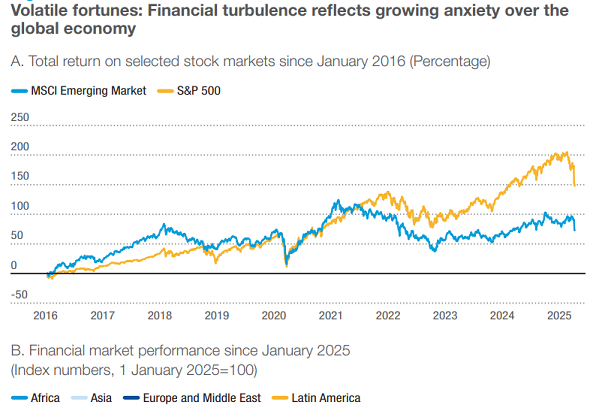The world economy is on a recessionary trajectory, driven by escalating trade tensions and persistent uncertainty, UN Trade and Development (UNCTAD) alerts in its new report, “Trade and Development Foresights 2025 – Under pressure: Uncertainty reshapes global economic prospects”.
Global growth is projected to slow to 2.3% in 2025, placing the world economy on a recessionary path, the report says. It cites mounting threats including trade policy shocks, financial volatility and a surge in uncertainty that risk derailing the global outlook.
In April 2025, concerns over the global economic context and the impact of trade policy shifts have translated into major financial turbulence. Sharp corrections and significant losses in financial markets followed weeks of volatility that marked the opening months of 2025.
With the so-called financial ‘fear index’ at its third highest level – after the peaks of 2008 and 2020 – fears of recession in the United States are growing, while the international ramifications of tariff tensions add to investor anxiety regarding the prospects for economies worldwide
Global trade tensions escalate
Rising trade tensions are impacting global trade, with UNCTAD noting that recent tariff measures are disrupting supply chains and undermining predictability. “Trade policy uncertainty is at a historical high,” the report notes, “and this is already translating into delayed investment decisions and reduced hiring.”
Challenges for the Global South
The slowdown will affect all nations, but UNCTAD remains concerned about developing countries and especially the most vulnerable economies. Many low-income countries face a “perfect storm” of worsening external financial conditions, unsustainable debt and weakening domestic growth.
UNCTAD underlines the real threat to economic growth, investment, and development progress, particularly for the most vulnerable economies.
South-South trade and regional integration offer opportunities
UNCTAD points to the growth of trade among developing countries (South-South trade) as a source of resilience. Already accounting for about one third of global trade, “the potential of South-South economic integration offers opportunities for many developing countries”, the report notes.
Policy options
UNCTAD urges dialogue and negotiation, alongside stronger regional and global policy coordination, building on existing trade and economic ties. “Coordinated action will be essential to restore confidence and keep development on track,” the report concludes.

